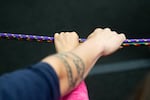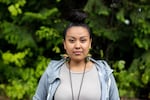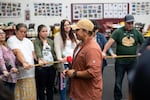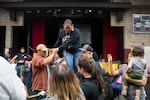Josh Cocker stood among a group of Grand Ronde tribal members and asked for someone to take a healthy risk. Cocker and his co-facilitator, Shalene Joseph, had spent the last two days in a community gymnasium in Grand Ronde, Oregon, leading group exercises meant to start the healing process and deepen the community’s understanding of belonging, interdependency and generosity.
On the third day, they introduced the rope exercise.
Kimberly Contreras stepped forward. The goal was to climb up onto a pair of climbing ropes, suspended only by the community’s strength and walk around the circle. It seemed like an impossible task, but it wasn’t — and that was the point.
Legs shaky and eyes wide, Contreras grabbed Cocker’s hand and rose up. Amid gasps and words of encouragement, she gained her balance. Carefully, so as not to step on anyone’s hands, she made her way around the circle.

Grand Ronde tribal community members hold onto a pair of climbing ropes as part of a group exercise.
Kaylee Domzalski / OPB
Contreras, a member of the Confederated Tribes of Grand Ronde, was one of dozens to attend the second year of Gathering of Grand Ronde Tilixum, a three-day, community-wide meeting centered on healing and wellness. Her children and her grandchild also participated.
“Being able to actively engage and making this a community effort is a beautiful thing,” Cocker said as Contreras stepped safely back on the ground. “This right here is what happens when we are living in balance.”
He and Joseph have helped lead workshops like the Gathering of Grand Ronde since they were teenagers. Now at 26 years old, they’re part of a movement aimed at healing their generation.
A Generation At Work
Joseph and Cocker are founding members of an intertribal group called the Indigenous 20 Something Project. Their goal is to end the transmission across generations of trauma caused by historical and systematic genocide. It's known as intergenerational trauma and is also perpetuated by social, health and economic disparities experienced by Native communities.
As I20SP members, they’ve traveled to communities in New York and Minnesota, to Oregon and Washington for trainings on conflict resolution, team building and moving past trauma. After a suicide in early 2019, the I20SP was asked to visit the Northern Cheyenne Indian Reservation in Lame Deer, Montana, to train on loss and grief with the reservation’s youth.
This work is the continuation of the Native Wellness Movement. The NWM began in the 1970s as a response to health problems within Native communities, such as alcoholism, drug abuse and diabetes. It introduced language around compassion, respect and resiliency to healing.
It also created institutions to provide support for those looking to heal from historical trauma, like the Gresham-based Native Wellness Institute. The institute holds training sessions on living in balance by integrating cultural reconnection with positive psychology — the scientific study of well-being. Where wellness is the balance within an individual, well-being goes further to include positive relationships, resilience, hope, and connection to community and culture.
The I20SP formed two years ago as a generational reaction to these ideas. Seventeen 20-somethings from across Native communities gathered at the end of a weeklong youth wellness summer camp put on by the Native Wellness Institute in Grand Ronde, Oregon, to talk about two central questions:
- What does healing mean to you?
- How do you bring that healing to a generation?
“What was incredible was that very first conversation,” Joseph said. “It wasn’t like, ‘This is my trauma, and this is where I come from.’ Or it wasn’t like, ‘These are the deficits.’ The whole conversation was very abundant space.”

Shalene Joseph is a founding member of the Indigenous 20 Something Project. Joseph has been facilitating conversations on healing and wellness since she was a teenager.
Kaylee Domzalski / OPB
During the meeting, they realized that while there were activities like the wellness camp and community gatherings for Native children and elders, there were few outlets for young adults.
“When [elders] tell their story … they’ll talk about the hardships that they went through … and then they’ll talk about how they came to be where they are now,” Cocker said.
“That in-between time, that hardship, was in their 20s. So we want to make sure that we’re not losing each other.”
Ending the cycle of intergenerational trauma within a single generation is an enormous task. But with the formation of the I20SP, these young leaders created both a resource for communities and a network of support for one another.
An Ongoing Process
For Joseph and Cocker, the creation of the I20SP was another iteration of work they’d been doing for years. Joseph, who is Gros-Ventre and Athabaskan, grew up attending trainings within Native Wellness Institute. Joseph’s mother is its director.
Joseph graduated from UCLA with a master's in American Indian Studies and focused her research on historical wisdom. Cocker, who is Kiowa and Tongan, trained as a youth leader within his tribe’s military group and worked as an outdoor behavioral health care facilitator.
Working within the I20SP has deepened their understanding of how to unpack the effects of trauma in their own lives. Engaging in conversations on healthy relationships is one way to break the cycle of trauma.
“I think, just because we do this work, doesn’t mean we’re exempt from trauma,” Joseph said. “What really kicked me in the butt is that I have a little niece, who’s 2 years old, and for me, it was a reality check. The things I do will then affect her, my siblings as well … so continuously always wanting to do better, not only for the next generation but for our generation now. We matter now.”
Understanding the history of genocide within Native communities also contributes to the healing process. But rather than solely focusing on oppression, Joseph looks at healing through a lens of resiliency and survival.
“It’s creating an understanding instead of just blanket terms of white supremacy or colonization,” Joseph explained. “It’s looking deeper at, ‘How does that affect us?’ I think we go into these communities and we’re like, ‘OK, what are the systematic issues?’ … And then it’s like, ‘How do we fix these?’”

Josh Cocker, a member of the Indigenous 20 Something Project, asks for someone in the Grand Ronde community to take a healthy risk.
Kaylee Domzalski / OPB
For Cocker, a combination of cultural reconnection, a return to Indigenous practices and acknowledging growth is part of the solution.
“Sometimes we’re actually making fire together,” Cocker said. “Sometimes we’re building a shelter together. Sometimes we’re out in ceremony in the sweat lodge together. And other times we’re sitting and speaking directly to the principle and sharing those things.”
Providing The Tools
Though Joseph and Cocker were 26 years old, a few decades younger than many of the attendees at the Gathering of Grand Ronde, their job was to start the conversation and then step back to let the community reflect.
“The community is doing it themselves because they know the information,” Joseph said. “Sometimes it’s just the reminder, or sometimes it’s just thinking outside of what we’re used to, or relearning behaviors.”
That’s where group exercises come in. In one exercise, Joseph asked everyone to partner up and share 20 things they were grateful for. In another, they asked groups of nine to write down how their mental, physical, emotional and spiritual selves were in balance. Beyond discussing difficult topics and personal introspection, these exercises help build a stronger community.
It’s why Contreras walked on the ropes.

Kimberly Contreras walks on ropes around the circle with the help of Josh Cocker.
Kaylee Domzalski / OPB
“I felt really supported,” Contreras said as she rejoined the circle.
“I felt like we were working as a team,” another community member said. “We all had to count on each other.”
Building positive relationships with a community is an essential component healing. That’s why it’s important that the I20SP is not only made up of a single generation, but is also reaching across Native communities and age groups to guide the conversation. They’re creating new norms and setting examples on healthy relationships and wellness for the next generation.
Contreras hopes the group’s healing work in Grand Ronde will improve the lives of her children and grandchildren.
“If they start the healing process early,” she said, “then maybe, by the time they reach my age, they’ll be teaching.”
Read more about the Wellness Warrior Camp, which members of I20SP lead every summer in Grand Ronde, here.

